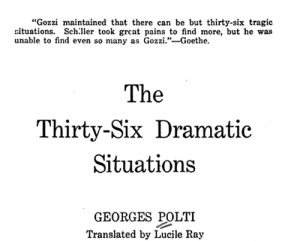The “Periodic Table” meme has gotten a little threadbare, but I did like this recent one (picked up via Laughing Squid) http://laughingsquid.com/the-periodic-table-of-storytelling-uses-classic-tropes-as-elements/
It links through to TVTropes, truly a weapon of mass distraction.
 Of course, all genres and disciplines have their tropes and clichés. When I was a child, I found my mother’s copy of Polti’s The Thirty-Six Dramatic Situations and thought “only 36?” we have more than that in our household. Couldn’t make heads or tales out of it as a 4th grader. Years later it was re-released and I got it out of the library on a lark. It turns out to be learned, and rather interesting, and yes the same plots show up again and again; something he traces to Greek drama often. I don’t remember most of them them, but am sure that the great hits are all there: “a stranger comes to town” “cat and a dog in a bag together” “love under false circumstances” “the night we never met” “wounded healer” all variety of love polygons, overheard confessions, crossed signals, love close up and far away, mistaken identity; and that perennial favorite “embarking on a daring enterprise.”(Just looked that one up: it’s #9).
Of course, all genres and disciplines have their tropes and clichés. When I was a child, I found my mother’s copy of Polti’s The Thirty-Six Dramatic Situations and thought “only 36?” we have more than that in our household. Couldn’t make heads or tales out of it as a 4th grader. Years later it was re-released and I got it out of the library on a lark. It turns out to be learned, and rather interesting, and yes the same plots show up again and again; something he traces to Greek drama often. I don’t remember most of them them, but am sure that the great hits are all there: “a stranger comes to town” “cat and a dog in a bag together” “love under false circumstances” “the night we never met” “wounded healer” all variety of love polygons, overheard confessions, crossed signals, love close up and far away, mistaken identity; and that perennial favorite “embarking on a daring enterprise.”(Just looked that one up: it’s #9).

Polit was writing mostly about 19th century and earlier works, where masters and servants were a big trope in storytelling, whether tragic or comic. And what a godsend servants and class relations were to writers (judging by the insane popularity of Downton Abbey to audiences too). They can drive dialogue and action on as they overhear, interfere, serve loyally or betray, and of course tumble in and out of love, bed, windows, jobs, jump seats and much else with cliff-hanging verve. Yet another trope. Gotta wind down. Perhaps a Biblical quote, the original urtext/fake book for so many plots, provides a good way to end:
“What has been will be again,
what has been done will be done again;
there is nothing new under the sun.”
So true, particularly if you are a TV writer!

